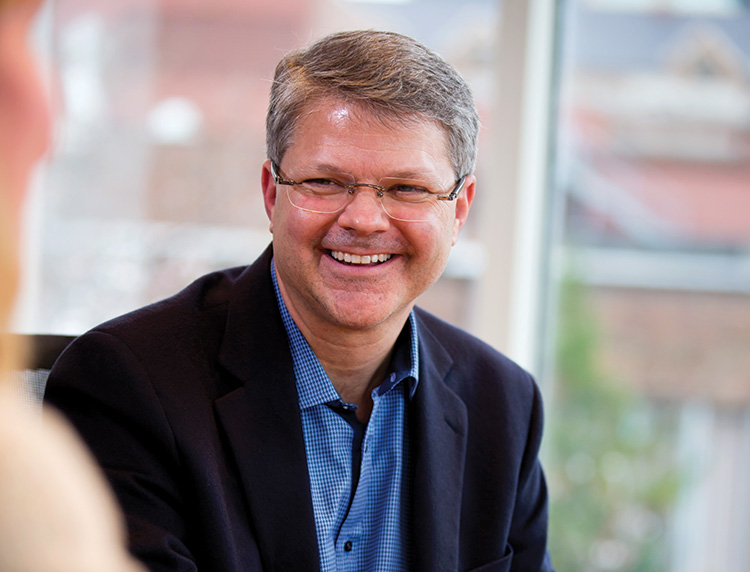If you’re one of the millions of investors who invest in managed accounts or mutual funds at Fidelity Investments, then you know Derek Young’s work. Young, MBA’91, is president of Fidelity’s Global Asset Allocation division and vice chairman of Pyramis Global Advisors. He leads an investment division at Fidelity that provides investors with solutions that can help them meet their financial needs from retirement and college planning to wealth management and tax-sensitive investing. His division’s clients include individuals, intermediaries and institutions.
“We try to make investments simple for the investor,” he says, “by devising strategies for today and through retirement.”

Those investment strategies are included in 401(k), 403(b) and defined benefit plans, including the popular Fidelity Freedom Funds.
Young’s business is responsible for $568 billion in assets under management. His team is responsible for managing an array of investment solutions as well as for the online retirement planning and calculation tools on Fidelity.com. It also provides personalized wealth management strategies for Fidelity’s high net worth clients looking to build, preserve and transfer their wealth.
“One size fits me” investment plans
Today’s investors, Young says, are increasingly choosing plans designed specifically for them. “Our clients are transitioning from ‘one size fits all’ to ‘one size fits me,’” he says. “More people are transferring their retirement planning to an investment manager.”
Whether using an investment manager or not, Young says that the most important piece of guidance he can share is “develop a long-term strategy and stick with it.”
“Young’s business oversees $568 billion in assets.
“The problem for most people,” he says, “is that they pull their money out when they see the market falling and get back in when it goes up. That means they’ve sold low and bought high, which is very different from how they make other purchases.
“In asset allocation, we favor building a well-diversified portfolio consisting of multiple asset classes focused on your unique risk and return needs to achieve your specific investment goals.”
Instead of “buy and hold,” Young recommends “buy and review.” He points to Fidelity’s Freedom Fund, for example, which targets the investor’s retirement date. The diversified, age-based portfolio of mutual funds is reviewed regularly and the allocation becomes more conservative as the retirement year approaches. After the target date passes, the fund becomes even more conservative.
Save, save, save
For young investors, he has three words of advice: save, save, save. “What people save in their 20s and 30s is most important for wealth creation and having enough money for retirement,” Young says.
“One of the most difficult situations I’ve had to watch is baby boomers who are nearing retirement and find that they haven’t saved enough. That means they’ll have to work longer than they planned, or change their lifestyle significantly, or both,” he says.
Young keeps a steady eye on market activity and world trends, which affect the balance of assets in any portfolio. He notes that currently, the overall U.S. economy is expanding and benefiting from a decline in oil prices.
“This backdrop should be generally constructive for domestic equities,” he says, adding that global economic trends remain slower. Young does caution, however, that trying to time the market by predicting change is difficult for even the very best investors. “It is often the source of significant losses for individual investors in particular,” he says.
Career kick-start
Young began thinking about a career in investment management following an internship with the State of Tennessee between his first and second year at Owen.
“I worked with the state pension plan, where we were dealing with large sums of money,” he recalls. “After that I decided to work toward becoming a chartered financial analyst.” His career received a kick-start one afternoon in 1991 at a gathering in the Management Hall courtyard.
“Bill Taylor from the Federal Reserve Bank spoke to Professor Dewey Daane’s class that day,” recalls Young, who was then in his second year. “After class I invited him to come to the party. We were talking about the tough job market for MBAs at that time, and he said, ‘If you send me your résumé, you’ve got a job.’”
Young took Taylor up on the offer and after Commencement, became a senior financial analyst in charge of derivatives and capital markets for the Federal Reserve Board in Washington, D.C.
He later joined KPMG as a senior manager in regulator risk management practice. “I was trading derivatives, which are important tools when used appropriately,” he says. “My finance professor, Hans Stoll, had a strong background in derivatives, which was cutting edge at the time. His instruction was helpful to me at the Federal Reserve and with KPMG.”
Since joining Fidelity in 1996, Young has served as portfolio manager of various funds, managed multiasset-class asset allocation portfolios, served as co-lead of the Fidelity Canadian Asset Allocation team, led Fidelity’s U.S. Asset Allocation Committee and represented North America on the firm’s global asset allocation committee. Before his promotion to president of the company’s global asset allocation division in 2011, Young was Fidelity’s chief investment officer for asset allocation.
Drawn by collegiality
A native of Georgia, Young came to Vanderbilt after earning a bachelor’s degree in 1986 from Troy University in Alabama. He was attracted by the business school’s reputation for faculty and student collegiality.
Today, the 50-year-old father of two college-age daughters lives and works in Boston. He is a member of the Owen School’s alumni board and says the school’s supportive culture has also stood him well professionally.
“Vanderbilt MBAs have a unique ability to work in teams and partner with their peers rather than achieving their personal goals at the expense of their teammates,” he says. “The sum of the whole is more than the sum of its parts.”

Leave a Reply